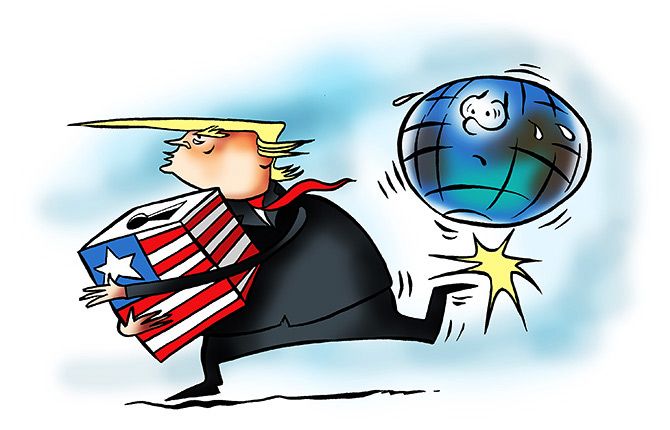'Trump's anti-trade, anti-immigrant rhetoric reminds me of Chinese history,' says A V Rajawade.
Illustration: Uttam Ghosh/Rediff.com

Since the 2008 crisis, global trade growth, in absolute terms and also as a percentage of the global output, has been uneven and well below the trend line of the previous three decades.
Global trade registered a sharp fall in 2009. But there was a revival in 2010 and 2011, and stronger growth in the following three years.
Trade has registered a drop in 2015, partly because of a fall in commodity prices in general and in particular, crude oil, the world's most traded commodity.
A few months back, at their last summit meeting, G20 leaders expressed 'concern (at) the slow growth in trade and investment globally' and reaffirmed their commitment to 'inclusive, robust and sustainable trade and investment growth.'
This commitment is now being challenged by the Trump agenda of putting 'America First.' He has threatened to withdraw from several free trade agreements/initiatives and to impose high import duties on Chinese (and Mexican?) exports to the US.
This anti-globalisation agenda should be a matter of concern to the entire developing world, particularly Asia, which has benefited enormously from globalisation and trade liberalisation over the last three to four decades.
China is perhaps the most striking example, rising from nowhere in 1980 to the world's largest economy measured in purchasing power parity exchange rates now.
The number of people in the world living below the poverty line has fallen by a billion thanks in no small measure to the rapid growth in Asia, which benefited by pursuing globalisation on its own terms: Managed exchange rates and capital controls.
We in India also grew far more rapidly after the reforms of 1991 as compared to the 'Hindu rate of growth' in much of the earlier four decades.
To be sure, even now, the world's largest number of people living below the poverty line are in India.
In other words, globalisation has led to lower income inequalities between countries, but has also led indirectly to rising income inequalities within countries.
In Globalization and Its Discontents, published 15 years ago, Nobel Laureate Joseph Stiglitz argued that 'the net effect of the policies set by the Washington Consensus has all too often been to benefit the few at the expense of the many, the well-off at the expense of the poor.'
It is perhaps the 'discontents' in the US, who elected a new president just about two months after the G20 Summit.
In the US, the worst sufferers of globalisation have been the white middle class, whose incomes have stagnated with the decline of the manufacturing industry.
They blame imports, particularly from China and Mexico, and immigrants from south of the border for their plight.
It is equally true that cheap imports allowed them to consume more even as incomes were stagnant.
This has led to persistent US trade deficits -- in other words, the excess consumption needed a strong (overvalued) dollar, despite the huge loss of output and growth this entailed.
In 2015, the US suffered a trade deficit of $800 billion in goods and $500 billion in goods and services taken together.
To be sure, the world's largest democracy, India, is suffering from even larger deficits as a percentage of gross domestic product, but more on this in a later article.
Coming back to Donald Trump, would reducing imports from China and Mexico, and cutting taxes help create growth and employment?
Or will it only increase inflation unless the basic problem of an overvalued exchange rate is solved?
Trump's anti-trade, anti-immigrant rhetoric reminds me of Chinese history.
At one time, China was the world's most advanced and outward-looking civilisation, which invented paper, printing, gunpowder, etc, well before they appeared in Europe.
In the 15th century, China had the world's most powerful navy, undertaking voyages and servicing trade with Africa, Arabia and the Persian Gulf.
The Silk Road was a major trading route with Central Europe.
Then the Chinese emperor ordered the destruction of all ocean-bound vessels, in order to sever polluting contacts with 'barbarians', that is, foreigners.
Arguably, China's decline as an advanced civilisation started then; China and India accounted for 75% of global GDP in the 15th century.
By the early part of the 20th century this had fallen to single digit.
Trade protection measures taken by several countries, including the US, in the 1930s, escalated a recession into a depression in the world economy.
Will Trump's 'America First', anti-immigrant, anti-trade stance lead to the same result in the 21st century?
A V Rajwade is Chairman, A V Rajwade & Co Pvt Ltd.











